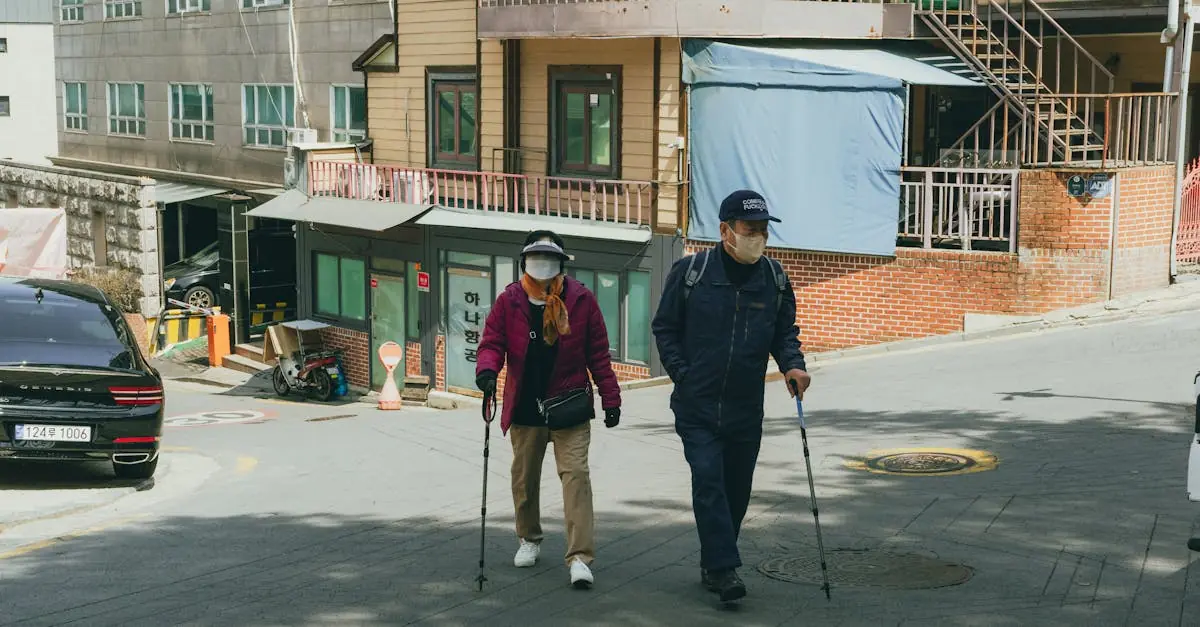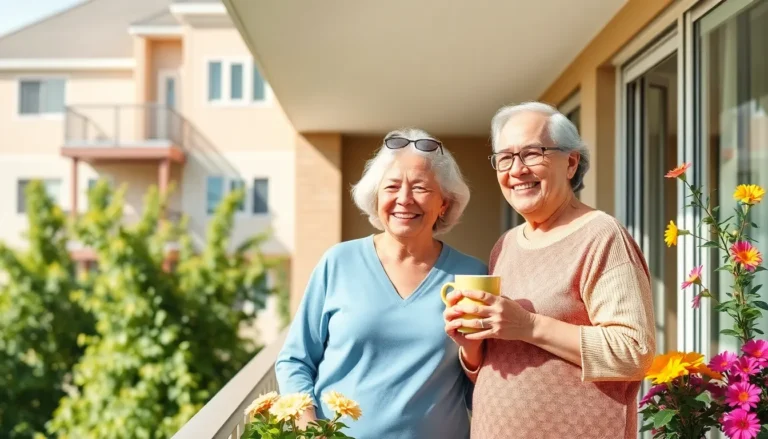Choosing a retirement neighborhood can feel like picking a new favorite ice cream flavor—overwhelming and a bit daunting. With so many options out there, how does one know which community will be the cherry on top? The reputation of a retirement neighborhood isn’t just a buzzword; it’s the secret sauce that can make or break the golden years.
From friendly neighbors to engaging activities, the right community can transform retirement from a quiet snooze fest into a vibrant adventure. After all, who wants to spend their days in a place where the biggest excitement is watching grass grow? By understanding what makes a neighborhood tick, retirees can find a place that fits their lifestyle and ensures those years are filled with laughter, friendship, and maybe even a bit of mischief.
Table of Contents
ToggleOverview of Retirement Neighborhood Reputation
Retirement neighborhood reputation serves as a key factor in determining the quality of life for seniors. Positive reputations often arise from attributes like safety, amenities, and community engagement. Communities with strong reputations attract retirees seeking active lifestyles and social connections. Many individuals view recommendations and online reviews as vital resources when researching potential neighborhoods.
Engaging with current residents offers firsthand insights into the community atmosphere. Residents often share their experiences regarding social activities, healthcare facilities, and transportation access. A vibrant neighborhood might feature diverse programming, enhancing overall satisfaction.
Research indicates that a neighborhood’s reputation can directly influence property values. Well-regarded areas generally maintain or increase in value, making them financially appealing for future homeowners. Safe environments foster peace of mind, reducing stress for retirees and their families.
A community’s reputation reflects the collective satisfaction of its residents. Active local governance contributes to maintaining standards, building trust among retirees. Many neighborhoods host events that encourage participation, strengthening community bonds.
Investigating crime rates and healthcare options also helps assess neighborhood reputations. Secure environments contribute to long-term contentment, while quality healthcare access ensures peace of mind. Retirees often prioritize neighborhoods known for their active clubs and organizations.
Evaluating the reputation of a retirement neighborhood can streamline the decision-making process. Information gathered online and from social interactions clarifies which areas align with personal values and lifestyle preferences. Making well-informed choices leads to happier, more fulfilling retirement experiences.
Factors Influencing Neighborhood Reputation
A neighborhood’s reputation hinges on several key factors. Understanding these elements aids retirees in selecting the right community.
Community Engagement
Active participation in community events fosters strong bonds among residents. Interest groups and clubs create opportunities for social interaction. Engaging residents not only enhances social life but also nurtures a supportive environment. Organized activities lead to improved mental and emotional well-being. Access to clubs and volunteer opportunities can enrich retirement experiences significantly.
Safety and Security
A strong sense of safety directly contributes to neighborhood reputation. Low crime rates enhance peace of mind for retirees and their families. Well-lit streets, neighborhood watch programs, and responsive local law enforcement indicate a commitment to security. Safe environments encourage outdoor activities and socializing, promoting an active lifestyle. Community vigilance often leads to timely crime prevention, further solidifying neighborhood desirability.
Accessibility to Amenities
Proximity to essential amenities makes a neighborhood attractive to retirees. Access to healthcare facilities, grocery stores, restaurants, and recreational areas greatly influences life quality. Walkability and public transport options increase convenience, catering to varied mobility needs. Local amenities often enhance social activities, providing spaces for gatherings and leisure. Quality of life improves when all necessities are within reach, positively impacting neighborhood reputation.
The Role of Online Reviews
Online reviews greatly influence the perception of retirement neighborhoods. They shape opinions and provide insight into community experiences.
Impact of Social Media
Social media platforms serve as valuable resources for prospective residents. Residents frequently share their experiences and opinions about their neighborhoods. Interactions on these platforms allow potential retirees to understand the community atmosphere firsthand. Posts and comments often highlight local events and safety measures, offering immediate context about life in the area. Positive interactions can lead to a favorable view of a neighborhood, while negative feedback acts as a warning signal. Engaging with community groups on social media encourages interaction and provides a sense of belonging even before physically moving.
Importance of Local Forums
Local forums provide tailored discussions about specific retirement communities. They often feature detailed conversations about amenities, services, and resident satisfaction. Current residents share recommendations based on their personal experiences in these forums. Retirees find it helpful to ask questions directly and receive timely responses from locals. Threads discussing safety issues or healthcare access provide essential information for assessing neighborhood reputation. Such platforms foster transparency and facilitate connections with other potential residents looking for similar lifestyles. Informed decisions stem from participation in these discussions, ultimately leading to a smoother transition into retirement life.
Case Studies of Notable Retirement Neighborhoods
Exploring successful retirement neighborhoods reveals valuable insights. Various communities exemplify the positive impact of reputation on retirees’ experiences.
Success Stories
Sunrise Village showcases a vibrant environment conducive to active living. This retirement neighborhood emphasizes community engagement, hosting regular events that foster social connections. Residents enjoy access to top-notch healthcare facilities, contributing to overall well-being. Additionally, positive online reviews highlight the neighborhood’s safety and amenities, attracting new retirees. Similarly, Evergreen Estates features walking trails, community gardens, and fitness programs that enhance residents’ lifestyles. These attributes lead to a strong reputation, making it a sought-after destination for those looking to enjoy their golden years.
Lessons Learned from Negative Reputations
Certain neighborhoods illustrate the consequences of poor reputations. Maplewood Heights struggled with rising crime rates, prompting concerns among current and prospective residents. Online reviews reflect these worries, revealing issues related to safety and inadequate amenities. In another case, Birchwood Meadows experienced declining property values due to negative perceptions about community engagement. Residents reported a lack of activities and support services. Ultimately, these challenges emphasize the necessity for retirement communities to actively address issues and maintain a positive reputation to ensure long-term success and resident satisfaction.
Conclusion
Choosing the right retirement neighborhood is a crucial decision that can shape one’s lifestyle and overall happiness. A community’s reputation plays a vital role in this process as it reflects safety, engagement, and access to essential amenities. Retirees who prioritize neighborhoods with positive reputations are likely to enjoy a fulfilling and active lifestyle.
Engaging with current residents and utilizing online resources can provide invaluable insights into a neighborhood’s atmosphere. By assessing reputation through various channels, retirees can make informed choices that enhance their quality of life. Ultimately, a well-regarded retirement neighborhood not only fosters a sense of belonging but also contributes to long-term satisfaction and property value.








